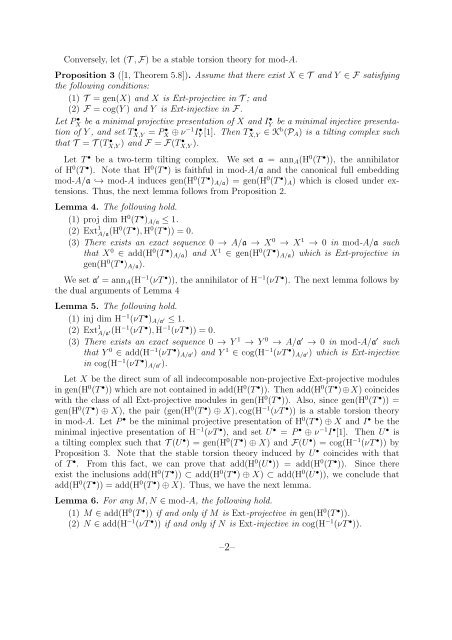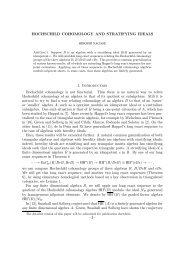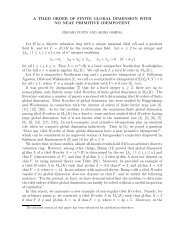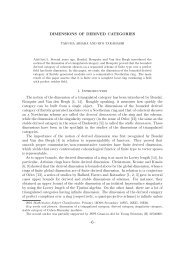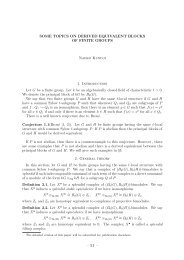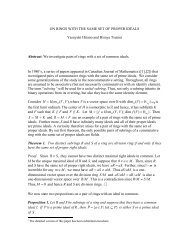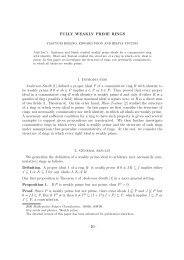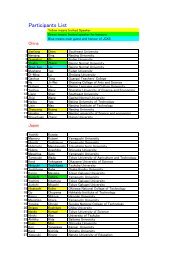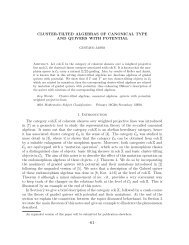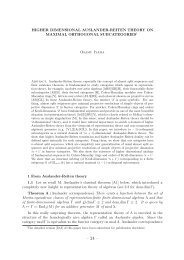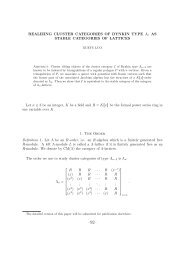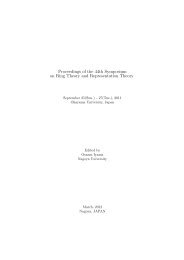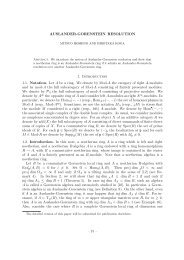Proceedings of the 44th Symposium on Ring Theory and ...
Proceedings of the 44th Symposium on Ring Theory and ...
Proceedings of the 44th Symposium on Ring Theory and ...
Create successful ePaper yourself
Turn your PDF publications into a flip-book with our unique Google optimized e-Paper software.
C<strong>on</strong>versely, let (T , F) be a stable torsi<strong>on</strong> <str<strong>on</strong>g>the</str<strong>on</strong>g>ory for mod-A.<br />
Propositi<strong>on</strong> 3 ([1, Theorem 5.8]). Assume that <str<strong>on</strong>g>the</str<strong>on</strong>g>re exist X ∈ T <strong>and</strong> Y ∈ F satisfying<br />
<str<strong>on</strong>g>the</str<strong>on</strong>g> following c<strong>on</strong>diti<strong>on</strong>s:<br />
(1) T = gen(X) <strong>and</strong> X is Ext-projective in T ; <strong>and</strong><br />
(2) F = cog(Y ) <strong>and</strong> Y is Ext-injective in F.<br />
Let P X • be a minimal projective presentati<strong>on</strong> <str<strong>on</strong>g>of</str<strong>on</strong>g> X <strong>and</strong> I• Y be a minimal injective presentati<strong>on</strong><br />
<str<strong>on</strong>g>of</str<strong>on</strong>g> Y , <strong>and</strong> set T X,Y • = P X • ⊕ ν−1 I Y • [1]. Then T X,Y • ∈ Kb (P A ) is a tilting complex such<br />
that T = T (T X,Y • ) <strong>and</strong> F = F(T X,Y • ).<br />
Let T • be a two-term tilting complex. We set a = ann A (H 0 (T • )), <str<strong>on</strong>g>the</str<strong>on</strong>g> annihilator<br />
<str<strong>on</strong>g>of</str<strong>on</strong>g> H 0 (T • ). Note that H 0 (T • ) is faithful in mod-A/a <strong>and</strong> <str<strong>on</strong>g>the</str<strong>on</strong>g> can<strong>on</strong>ical full embedding<br />
mod-A/a ↩→ mod-A induces gen(H 0 (T • ) A/a ) = gen(H 0 (T • ) A ) which is closed under extensi<strong>on</strong>s.<br />
Thus, <str<strong>on</strong>g>the</str<strong>on</strong>g> next lemma follows from Propositi<strong>on</strong> 2.<br />
Lemma 4. The following hold.<br />
(1) proj dim H 0 (T • ) A/a ≤ 1.<br />
(2) Ext 1 A/a(H 0 (T • ), H 0 (T • )) = 0.<br />
(3) There exists an exact sequence 0 → A/a → X 0 → X 1 → 0 in mod-A/a such<br />
that X 0 ∈ add(H 0 (T • ) A/a ) <strong>and</strong> X 1 ∈ gen(H 0 (T • ) A/a ) which is Ext-projective in<br />
gen(H 0 (T • ) A/a ).<br />
We set a ′ = ann A (H −1 (νT • )), <str<strong>on</strong>g>the</str<strong>on</strong>g> annihilator <str<strong>on</strong>g>of</str<strong>on</strong>g> H −1 (νT • ). The next lemma follows by<br />
<str<strong>on</strong>g>the</str<strong>on</strong>g> dual arguments <str<strong>on</strong>g>of</str<strong>on</strong>g> Lemma 4<br />
Lemma 5. The following hold.<br />
(1) inj dim H −1 (νT • ) A/a ′ ≤ 1.<br />
(2) Ext 1 A/a ′(H−1 (νT • ), H −1 (νT • )) = 0.<br />
(3) There exists an exact sequence 0 → Y 1 → Y 0 → A/a ′ → 0 in mod-A/a ′ such<br />
that Y 0 ∈ add(H −1 (νT • ) A/a ′) <strong>and</strong> Y 1 ∈ cog(H −1 (νT • ) A/a ′) which is Ext-injective<br />
in cog(H −1 (νT • ) A/a ′).<br />
Let X be <str<strong>on</strong>g>the</str<strong>on</strong>g> direct sum <str<strong>on</strong>g>of</str<strong>on</strong>g> all indecomposable n<strong>on</strong>-projective Ext-projective modules<br />
in gen(H 0 (T • )) which are not c<strong>on</strong>tained in add(H 0 (T • )). Then add(H 0 (T • )⊕X) coincides<br />
with <str<strong>on</strong>g>the</str<strong>on</strong>g> class <str<strong>on</strong>g>of</str<strong>on</strong>g> all Ext-projective modules in gen(H 0 (T • )). Also, since gen(H 0 (T • )) =<br />
gen(H 0 (T • ) ⊕ X), <str<strong>on</strong>g>the</str<strong>on</strong>g> pair (gen(H 0 (T • ) ⊕ X), cog(H −1 (νT • )) is a stable torsi<strong>on</strong> <str<strong>on</strong>g>the</str<strong>on</strong>g>ory<br />
in mod-A. Let P • be <str<strong>on</strong>g>the</str<strong>on</strong>g> minimal projective presentati<strong>on</strong> <str<strong>on</strong>g>of</str<strong>on</strong>g> H 0 (T • ) ⊕ X <strong>and</strong> I • be <str<strong>on</strong>g>the</str<strong>on</strong>g><br />
minimal injective presentati<strong>on</strong> <str<strong>on</strong>g>of</str<strong>on</strong>g> H −1 (νT • ), <strong>and</strong> set U • = P • ⊕ ν −1 I • [1]. Then U • is<br />
a tilting complex such that T (U • ) = gen(H 0 (T • ) ⊕ X) <strong>and</strong> F(U • ) = cog(H −1 (νT • )) by<br />
Propositi<strong>on</strong> 3. Note that <str<strong>on</strong>g>the</str<strong>on</strong>g> stable torsi<strong>on</strong> <str<strong>on</strong>g>the</str<strong>on</strong>g>ory induced by U • coincides with that<br />
<str<strong>on</strong>g>of</str<strong>on</strong>g> T • . From this fact, we can prove that add(H 0 (U • )) = add(H 0 (T • )). Since <str<strong>on</strong>g>the</str<strong>on</strong>g>re<br />
exist <str<strong>on</strong>g>the</str<strong>on</strong>g> inclusi<strong>on</strong>s add(H 0 (T • )) ⊂ add(H 0 (T • ) ⊕ X) ⊂ add(H 0 (U • )), we c<strong>on</strong>clude that<br />
add(H 0 (T • )) = add(H 0 (T • ) ⊕ X). Thus, we have <str<strong>on</strong>g>the</str<strong>on</strong>g> next lemma.<br />
Lemma 6. For any M, N ∈ mod-A, <str<strong>on</strong>g>the</str<strong>on</strong>g> following hold.<br />
(1) M ∈ add(H 0 (T • )) if <strong>and</strong> <strong>on</strong>ly if M is Ext-projective in gen(H 0 (T • )).<br />
(2) N ∈ add(H −1 (νT • )) if <strong>and</strong> <strong>on</strong>ly if N is Ext-injective in cog(H −1 (νT • )).<br />
–2–


